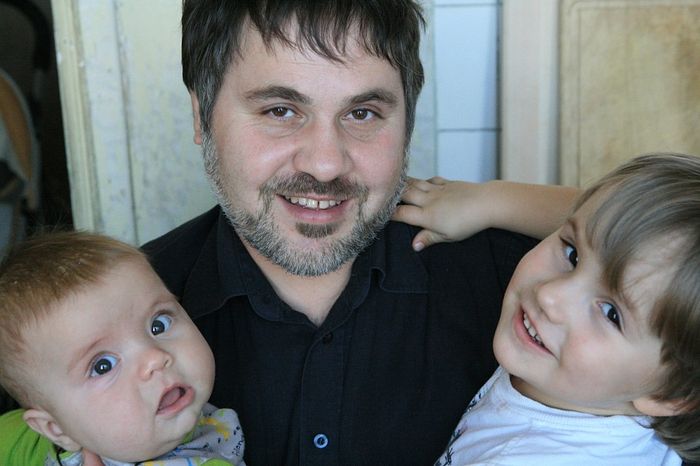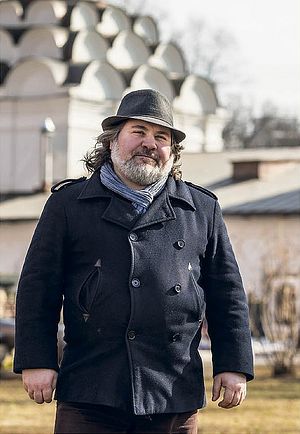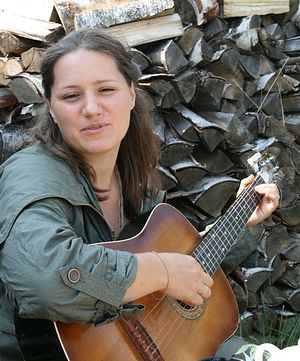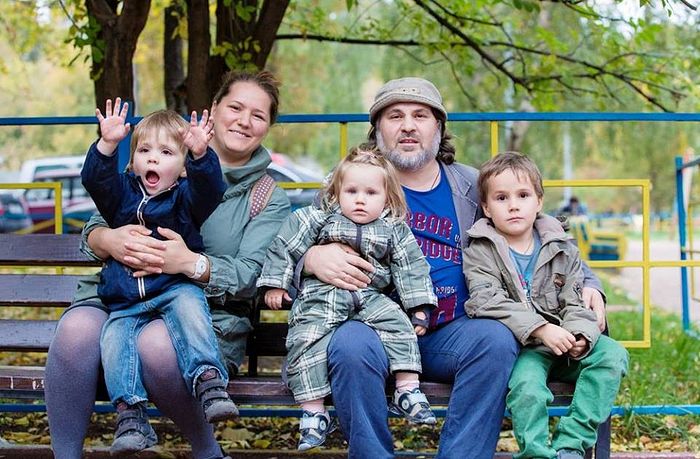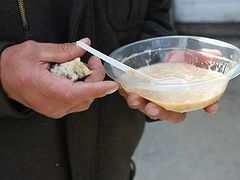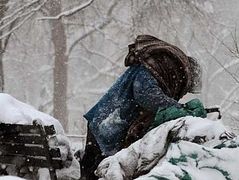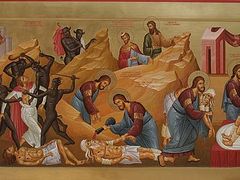Alexander Gezalov is one of the most famous people in our country that deals with the issue of orphaned children and other important social problems. This year he turned 48, and he has a family: a wife, four children and a dog. He is one of the leaders of the social center at the Donskoy monastery in Moscow. From the way he lives now it’s hard to tell that his entire childhood was spent at an orphanage, but only at first glance. Recently Alexander published a book called “A Bitter Childhood”, in which he explains what it’s like to grow up in the “system”. In a special interview with Alexander for the “Vinograd” journal, we talked about his new book, orphans and family life.
—To tell you the truth, I’m feeling a bit disconcerted because our interviews usually start with questions about one’s parents and what they gave you in life. But instead of parents, you had the orphanage.
—I give a lot of interviews, and the most frequent question I get asked is, “Why didn’t you become what most orphans become when they leave the orphanage?”
The answer may not seem entirely logical. However, above all, it is the reason for increased attention to the external environment—the ability to notice not only large strokes, but also small details. It’s because for the child in the orphanage it’s is the main method of teaching. Now it helps a lot in my work. Coming to some orphanage with which we work, I notice how many light bulbs are burned out, what needs to be changed, what to correct. After a quick survey, I can give exact figures of what is needed. But the main details that I have learned to notice are in people.
Thousands of people go through an orphanage. You learn to figure out what kind of person you’re talking to, what his eyes can tell you about him, how he acts, what’s going on in his family life. Many orphans have this kind of skill. A child at home constantly switches from one activity to another; he gets involved in different kinds of activities. But here you’re communicating with your fellow “cellmates” and strangers, and this kind of interaction doesn’t happen on a deep level; you do not get “involved”, and gain nothing from it besides observation skills.
I even wrote about it in my book. A stranger can come up to you and ask: “So, how are you doing here?” And at that moment you want to answer: “Well what do you think?” You get a huge amount of tactless, unethical questions that violate your personal boundaries. They ask about your family, your language, your mother… And it’s still like that to this day. All that’s left to do is observe things and draw conclusions. Thousands of people, tens of thousands of observations result in accurate conclusions. I read an American study that concluded that orphans are more knowledgeable than any psychologist, because their psychological observations and analysis outnumber the amount of experience any psychologist has.
It's one thing when you use these observations to acquire some sort of skill, for example, like actors do; but another when you don’t need this knowledge for anything specific, which is when it starts changing your perspective of the world.
—Perhaps psychologists could help change something in this respect?
—How can a psychologist help? His task is to "uncover" the problem. But what is there to “uncover”? Are we tin cans or something? The miserable conditions at orphanages don’t need “uncovering”. What an orphan needs is a thick layer of warm bonds, which no psychologist can provide.
—In your book you mentioned that you survived after the orphanage not so much due to help from state institutions, but also due to your subsequent life. How did you survive while your peers at the orphanage didn’t?
—At the orphanage, the children have no middle ground. There is no “buffer zone” that parents provide. It’s all either black or white. When one is offered a job in the criminal world, it’s an attractive offer, but only because of the inability to do something important on the good side.
Most people don’t care that much about you, while the criminal world, on the other hand, is much more interested and involved with you, because there you’re really needed in order to help them solve their problems. They look at and consider a lot of things about you. Will it be your height or weight that will allow you to climb through someone’s window, or your observation skills and the ability to pickpocket someone without being seen?
Although these kinds of things cannot be considered as something meaningful and important, for the orphan, it’s something that gets them involved and thus is better than nothing. And no-one else would really care about an orphan. These are the reasons why many orphans get involved in the criminal word. It gives them a chance to feel needed and important in some kind of common cause.
The criminal world had its influence on me as well. I got caught once and was put in jail with other criminals. They told me, “If you want to be like us with gold teeth and tattoos, and end up in a stuffy cell, then do as we do. If not, we’ll carry you out in that pot over there, and you run for it”. But I ran away by myself. I wanted to prove that I could manage without them. And somewhere deep inside of me I felt that this is not the way I want to live.
Two of my brothers were in jail for 10 years. And there were times when I was on the edge of getting put in jail, because when you’re from an orphanage, you’re considered guilty even when defending yourself. They think a priori that you’re from the criminal world, that you have “bad genes” and are simply inclined to crime.
—At orphanages, brothers and sisters who were born from the same parents usually don’t end up having a close bond between each other. Why does this happen?
—I couldn’t have had any bond, because my brothers and I were in different orphanages. Now relatives are placed in the same orphanage. But even in this case, if one remains secluded, the relationship will be destroyed.
The main reason lies in the fight for resources. The same thing happens in any closed institution be it jail or a penal colony or an orphanage. A child that ends up in such a place begins from the cradle to learn to defend his rights before the government, educators, other children, volunteers. Here the main importance lies in inherent mental capabilities. You have to know how to stand epfor yourself from a very young age.
Have you ever thought about why all “authoritative” criminals are talented people? Because if you’re a simpleton, you’ll remain a simpleton. A simple-minded criminal will never have authority. And at the orphanage, it’s the same thing; here family ties aren’t of first priority.
At orphanages volunteers often communicate with children while sitting on their bed. I’ve always wanted to ask them: “Did anyone invite you to sit down?” Don’t you understand that this is their personal space? And the orphan has already caught such a person on ignorance. Such a person is easier to manipulate, it’s easier for the orphan to get something he wants from him. That’s the way orphans get by.
It’s unpleasant to hear something like that, but it’s normal in their world. Just imagine, a child is only five years old and already has to think ahead and decide how to act. I remember when I was seven years old and the teacher called me fatherless, and added something else too. I could’ve let it go, but instead I heated up an iron and started running after her with it. I didn’t let her disgrace me. I needed to show her that there’s someone that can stand up for me, and that someone is me.
—In your book you said you ran away from the orphanage to defend your brother. So that means you still had some bond between each other?
—A few children were transferred to our orphanage and they told me that my brother was being bullied. So I got ready and went there myself and beat up the guy bullying him, even though he was older than me. Now I understand how I managed to do that then. It’s because he had lived with parents before, while I grew up at the orphanage.
The orphanage has its own “rules”. If you come from another orphanage to settle things out with someone, no-one stops you. And because I had a high status since I’ve been at the orphanage from my very birth, that fact really turned the circumstances to my advantage.
—But doesn’t such a deed imply some sort of family bonds between you two?
—No. It’s completely a “boy thing”. If my brother is getting disgraced, that means I’m getting disgraced. Then if you’d go somewhere, you’d get asked: “Aren’t you the guy whose brother everyone bullies?” If that would’ve happened to one of my friends rather than my brother, I’d have done the same thing.
—It’s not easy for an orphan to start a family, but you started one. What kinds of difficulties do orphan children experience, and what made it possible for you to overcome these difficulties?
—Russia hasn’t yet studied the damage that is done by leaving children to grow up in orphanages. In Europe and the US there are indicators according to which it’s forbidden to put a child in an orphanage.
But here we calmly place them in orphanages. But what happens afterwards, what does the child experience? There’s a movie by Olga Sinyaeva “Bluff, or Happy New Year” about that. Be sure to watch it! It shows what deprivation and attachment disorder are.
How did I manage to start a family? I don’t know. Perhaps I’m one of the ones that managed to put down roots while in “midair”. When you leave the orphanage, you you’re completely tattered. You have nothing and no-one cares about you, and you start from scratch. What probably saved me is service in the army on a submarine boat. You sit in a compartment for three years with nothing. You have a lot of time to think there, to look inside yourself.
After the army, I already knew where I’d go. The first thing I did was not return to Vladimir. I went to a theatre school. There I learned to feel, to express my emotions. It was hard for me in the beginning. I’m all tattered up, but I need to go on stage and act. But the theatre school gave me a lot. It truly “reprogrammed” me. By changing, by gaining the ability to listen, I learned a lot.
And now I have my own guidebook “Preparing an orphan for the future with the system of K. S. Stanislavsky”. I understood how his system works, it’s very important.
And after all these things: the army, sport, playing the guitar and theatre school, I realized, that I can get married.
—Did you have any difficulties in your relationship between each other?
—My first wife was a fashion model. And even though our marriage wasn’t official, the problem was not between us two. Her father asked me to show him my passport, and I had no address there. “What are you, homeless?” You get the desire to have something stamped on your forehead for others to see you’re worth something. If you’re not worth anything, you’ll never start a relationship.
—How did you get acquainted with your current wife?
—I had already understood that no one needs you when they don’t see that you’re worth something. I lived in an office at the time, and across me outside the window was a church I had built. You wake up in the morning, the church bells are ringing, you go to service and feel good.
I had experience with construction, and some friends came to see me for advice on construction work in a large church. I went to see the church, and there I met some people from Moscow. I saw my future wife among them, I liked her, and we started spending time with each other. Then there were relatives and questions about my address again. But this time things went better.
The father of my wife was a doctoral candidate of sciences, and her mother had a PhD. And their daughter has two university degrees. It’s Moscow after all. And how do you introduce me? “Meet our son-in-law, he graduated from vocational school.” Now I have a college education too, but it took me 7 years of life in Moscow to “settle in”.
Now my mother-in-law talks about us, about our three children, about our accomplishments. My wife owns a leisure center, “Gnezda”, and goes kayaking with the kids when it’s warm. I work at a social center in the Donskoy monastery; I know where to get resources and how to do this kind of work. We help the homeless and jail convicts.
—What are you like in your family?
—The dog gets it a lot from me. The kids too, I could yell sometimes. Now it’s easier because they’ve grown up. My kids are 4, 6, 8 and 20 years old. But my older daughter is not from this marriage.
—What do children mean to you?
—We live modestly; the kids have clothes and get enough food. The only thing I don’t do is try to teach them. I don’t try to give them my opinions and personal understanding of things. They’re different, and their mentality and gifts are different. And that’s good. As a father, if something needs to be done, we do it together. Like hammering a nail in, or constructing something. We have a kind of natural close bond.
But for me, they’re the most important thing in life. Who’ll ever cry for you if not your kids? For this reason I try not to do anything that might hurt them in some way.
—And what does a family mean to you?
—It’s the most important thing. A person that has no family always has some sort of problems. I have a family, so I can consider myself a happy person. I don’t know what I did that God gave me a family. Maybe because back then, during my bitter childhood, I didn’t upset Him that much.

